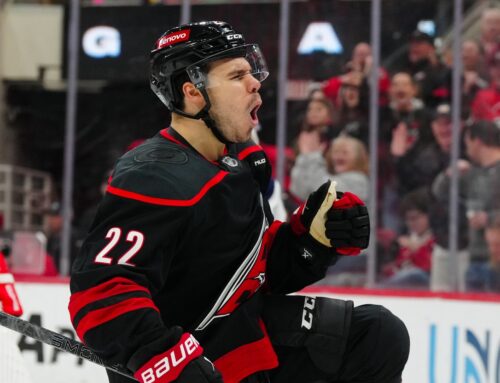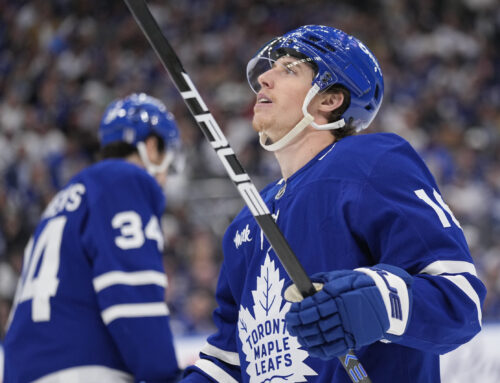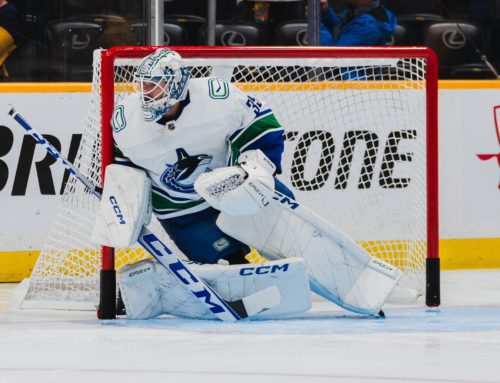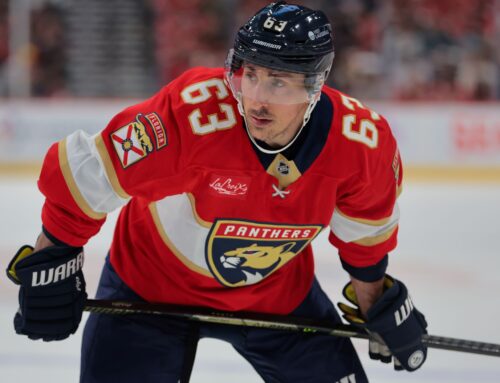
A few years ago I took a deep dive on the statistical qualities that best portended to playoff success concluding that the best predictor of any playoff series was goal differential. Since then, Adam Gretz has come out with his own model for Stanley Cup winners focusing on teams who finish top-10 in goal prevention, penalty killing and puck possession (score-close Fenwick percentage).
There is no perfect model, but I still believe that goal differential is a much better predictor of playoff success than anything. You can predict two thirds of all playoff series correctly just by banking on the team with the highest goal differential. Who cares how they got there? Whether it’s elite goaltending, puck possession, or shot quality, teams who consistently outscore their opponents over 82 games, tend to do better come playoff time. No Cup winner in the cap era has won without finishing top-10 in goals-for percentage.
There appears to be a very clear line that teams need to cross to have serious Stanley Cup credentials. They have score at least 52.5% of the goals in their games to win the Cup. No team with a percentage lower has won the Cup in the cap era and only three of the 24 Cup finalists of this era finished with a goals-for percentage lower than 52.5%. More than three quarters of all Conference finalists in the cap era have had a goals-for percentage above 52.5%.
In the average year nine teams will have a goals-for percentage above 52.5% so this doesn’t exactly whittle the field tremendously but let’s see who fits the criterion heading into last night’s action:
|
GF |
GA |
GF% |
|
|
Boston |
242 |
187 |
56.4% |
|
Nashville |
238 |
185 |
56.3% |
|
Winnipeg |
247 |
194 |
56.0% |
|
Tampa Bay |
266 |
211 |
55.8% |
|
Vegas |
247 |
201 |
55.1% |
|
Toronto |
248 |
211 |
54.0% |
|
Los Angeles |
219 |
189 |
53.7% |
|
San Jose |
228 |
200 |
53.3% |
|
Colorado |
237 |
217 |
52.2% |
|
Minnesota |
229 |
211 |
52.0% |
|
Anaheim |
213 |
197 |
52.0% |
|
Pittsburgh |
249 |
231 |
51.9% |
|
Washington |
233 |
220 |
51.4% |
|
St. Louis |
206
📢 advertisement:
|
196 |
51.2% |
|
Philadelphia |
228 |
221 |
50.8% |
|
Columbus |
209 |
204 |
50.6% |
|
New Jersey |
220 |
221 |
49.9% |
|
Florida |
220 |
221 |
49.9% |
Of the 18 remaining serious playoff contenders, eight are above the “Cup threshold” but only seven of them currently sit in a playoff spot. Conspicuously, there isn’t a single Metro team above the threshold meaning a “non-contender” could be looking at an easier ride to the conference finals, while the three contenders in the Atlantic division are left to slug it out for one spot. The imbalance of the playoff structure is one that should be rectified but that’s a discussion for another time.
As you gear up for your playoff pools it will be interesting to see where teams land in terms of goals-for percentage. This is one extra piece of information to help you pick teams to load up on.
*
30-goal season for Brendan Gallagher, the first of his career. He’d have gotten there sooner if not for injuries, which you have consider when valuing Gallagher going forward, but you also have to consider that he still isn’t an 18-minute a night forward so there is production being left on the table. It is worth noting that Gallagher’s minutes are up near 17 minutes a night during this productive second half where he has 15 goals and 28 points in 36 games. That portends to a strong 2018-19 season.
*
Aleksander Barkov is carrying an obscene load on a nightly basis. He and Anze Kopitar are the only two forwards in the league averaging over 22 minutes per game. If they sustain this pace they’ll be the first forwards to do so since the lockout shortened 2013 season. How Barkov is doing this, with predominantly defensive shifts against the oppositions best is crazy, but it’s even wilder that he has kept it up when you consider his injury track record. The 73 games he has played blow away his previous career high and may force us to reconceptualize what to expect from him going forward.
I want to see another healthy season from Barkov before forgetting the injury history, but I was singing his virtues pre-season even assuming he’d miss 10-15 games. He’s that good.
By the way, in that 2013 season Ilya Kovalchuk led all forwards in ice time averaging 24:44 per game, which is just unfathomable.
*
There are some extreme shooting percentages happening but Valentin Zykov sure is making an impact for the Hurricanes now that he’s finally getting a crack. In four games since being recalled he has three goals, five points and 12 SOG. They are giving the rookie an honest shake playing him 14 minutes a night with 75% of his shifts alongside Sebastian Aho and Teuvo Teravainen. He could be a decent option with which to close the season.
*
Just 11 minutes of action for Lias Andersson in his NHL debut, but he scored his first career goal so it was a productive one.
*
Matt Niskanen is having a solid close to the season with 10 points in the last 17 games despite being shutout of power play time. Niskanen might hit 30 points despite missing double-digit games and skating less than a minute of power play time per game. That’s impressive especially with what’s happened to Washington’s depth scoring. Niskanen’s fantasy value could spike if John Carlson (having a career year) heads elsewhere in free agency.
*
Some big-name prospect signings who should be in NHL lineups later this week:
Dynamic playmaking forward with speed and skill. The Sabres could use about five more of these to truly get competitive, but Mittelstadt will help. It sucks that he comes in only after the team lost Evander Kane at the trade deadline. One step forward, one step back. The fact that the Sabres are so bad opens up vast opportunity for Mittelstadt right away. One hopes he skates on Jack Eichel’s wing to start. There probably isn’t room on the top power play unit with Sam Reinhart having a big second half, but there will be minutes for Mittelstadt.
Read more about Mittelstadt here.
Henrik Borgstrom – Florida
Borgstrom destroyed college hockey with 95 points in 77 games and should be ready to make an immediate impact. With the enviable strength that the Panthers boast down the middle with Aleksander Barkov and Vincent Trocheck, we may see Borgstrom start out on the wing. He could have ludicrous value if plunked onto Trocheck’s wing opposite Jonathan Huberdeau. The Panthers could also slot him in on a depth line in an effort to get more out of one of the league’s worst bottom-six groups, but fantasy owners have to hope he can displace the unimposing trio of Frank Vatrano, Denis Malgin and Jamie McGinn that has been occupying time on that Trocheck line.
Read more about Borgstrom here.
Jordan Greenway – Minnesota
The forward has massive multi-category potential and should slot in on the third line with Matt Cullen and one of Nino Niederreiter or Charlie Coyle. The Wild have had a tough time finding PP time for Coyle lately so there may not be much for Greenway either.
Read more about Greenway here.
Adam Gaudette – Vancouver
He rates lower than Greenway and Mittelstadt but still has a high ceiling. Gaudette will no doubt get some NHL action given some of the Canucks’ injuries up front and could even get onto the top PP unit if they decide to bump Sam Gagner.
Read more about Gaudette here.
It’s worth noting that based on the timing of the signings, specifically that each player is 20 or will have turned 20 by the end of the calendar year, they’ll burn a year off their entry-level deals. This does push them closer to restricted free agency, but as long as these teams keep their professional games played under 10 they won’t have accrued a year of professional experience. That is going to have long-term ramifications for these players. They’ll be restricted free agents in the summer of 2020, but if they play less than 10 pro games (including AHL, Europe, etc.) they won’t have arbitration rights or even the ability to sign an offer sheet with another team. Essentially, they are without a contract but also without leverage. That’s a huge opportunity for these teams to squeeze them on contract #2.
Ensuring that these players don’t hit 10 pro games will also have ramifications for the looming Seattle expansion. If these teams keep the players from having accrued a year of pro experience this season, they’ll only have two under their belt come expansion draft time, which is huge because players with two years or less pro experience are exempt from the draft.
This only really affects Borgstrom and Greenway as I don’t believe Gaudette or Mittelstadt will be eligible for the AHL playoffs unless they are sent down rather than closing the season in the NHL. Would the Wild and Panthers trade RFA leverage and expansion draft eligibility for a long playoff push if Greenway and Borgstrom could be difference makers? I’m sure they would, but there are no guarantees. It’ll be interesting to see how they play this.
The Bruins let it ride with Charlie McAvoy giving him four AHL games before calling him up for six strong playoff games in their opening round loss to the Senators.
Pete Harling has more on the latest college prospect signings in his latest prospect ramblings.
*
I’m planning on doing a blowout Q+A in Friday’s ramblings so drop a line below or on Twitter, respond to this tweet.
Thanks for reading!
10 Comments
Leave A Comment
You must be logged in to post a comment.






 MIN
MIN MTL
MTL PHI
PHI COL
COL CHI
CHI ANA
ANA EDM
EDM

Do you think that this year’s relatively deep Metro division is actually a mitigating factor for determining who is actually a contender?
The 4 worst teams in the East are all in the Atlantic Division, and the Atlantic teams have a slight schedule edge due to that. I don’t think it degrades Boston, Tampa Bay, or Toronto as contenders, but it might be just enough to somehow have Pittsburgh & Washington just a little under the line you’ve drawn.
It’s not that significant, you play each team in your own div 4 times, a few play 5, it depends on whether your in the east or the west as well due to 1 less team & every team in your conference 3 times.
https://en.wikipedia.org/wiki/Season_structure_of_the_NHL
The disparity in quality of competition is far greater east to west than Atlantic to Metro even with 1 less team.
But yes a few extra points are garnered from such.
As Steve wrote above about goal differential for the playoffs it also shows well for the regular season. 7 teams are in the red in the east, NJ the 8th is even. In the west only 5 teams are in the red & it’s a far greater discrepency at the top end than the bottom. StL sits +13 & on the outside looking in in the playoff race. If they played in the east they would comfortably be sitting in a playoff spot as would Dallas.
I think it is significant for the above statistical analysis. An average of 1.5 extra games against the 4 worst teams in the conference is significant. Close to 15% of their games are against much weaker competition. Couple this with the fact that the other teams outside of the top 3 in the Atlantic are not really that great either…it makes a difference.
Considering the Rangers and Islanders are the worst 2 in the Metro…a much more difficult game than Buffalo, Ottawa, Detroit, Montreal. Even Florida isn’t that much better than those two teams. Remember, the worst team in the Metro would be the 5th best in the Atlantic…and perhaps even be 4th best if they were playing those extra games in the Atlantic.
I’m not sure where this narrative came from but it’s been floating all year and carries no weight under close inspection.
If you’ve looked at the schedule makeup the rest of the way, most every team is closing out with divisional games. In essence, those extra games that teams are playing within their own division haven’t even been played yet. For instance, Tampa Bay has played Pittsburgh, Washington, Columbus and Philly as many times as they have played Buffalo. They’ve played all those teams LESS than they’ve played against Boston.
If you look at the record for teams vs each division, the Capitals have beaten up on the Atlantic as much as Tampa Bay, Toronto and Boston have. The disparity comes in how the teams in the Metro have fared vs. the West compared to how the Atlantic powers have. The best Metro teams are treading water against the West while the best Atlantic teams have crushed it against everyone.
I cannot agree and don’t see your logic. For example, TB has already played Florida, Montreal, Detroit, and Ottawa 4 times and Buffalo 3 times. Even if a Metro team had played all of their games against those teams…it would only be a max of 3 games.
Pitts for example has only played Det, Mon, and Ottawa twice each prior to tonight.
Again, look at the record of teams vs. each division. The separation is how the top three Atlantic teams play against the West as compared with how the Metro plays the West. If these teams were on par they’d have similar records. It’s not close.
The biggest advantage that Boston, Tampa Bay and Toronto have is that they don’t have to play themselves. They have proven a step above against similar opponents.
I am not talking about results. I am suggesting that Toronto, Tampa, and Boston have had easier schedules than those in the Metro. Whether or not all teams take advantage of mis-matches is irrelevant.
You can’t tell me that any NHL team wouldn’t prefer to have 4 games against Florida, Montreal, Detroit, Ottawa, and Buffalo…then have to play 4 against Columbus, New Jersey, Carolina, Rangers, and Islanders. Every single NHL team would take the extra games against the Atlantic group.
Therefore, not only have the big 3 Atlantic teams not had to play themselves, they also had a more favourable schedule.
This is not even considering the insane number of back to backs a team like Pittsburgh has had (19) vs Toronto (15), Tampa (10), and Boston (11).
Heard you on Sirius this weekend Steve – you came off great.
The Kovalchuk 24:44 TOI isn’t outrageous when you consider that it was a 48 game season and 5:28 of it was PP Time. Averaging 19:16 of non-PP time is in line with Kopitar and Barkov, and they’re doing it in a full season.
Thanks Rick.